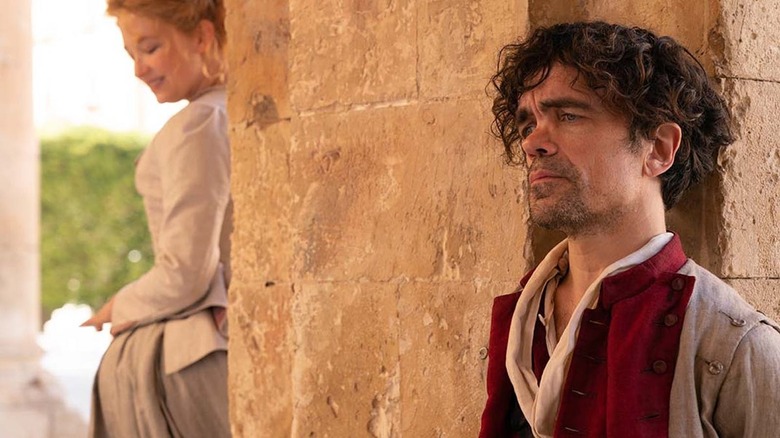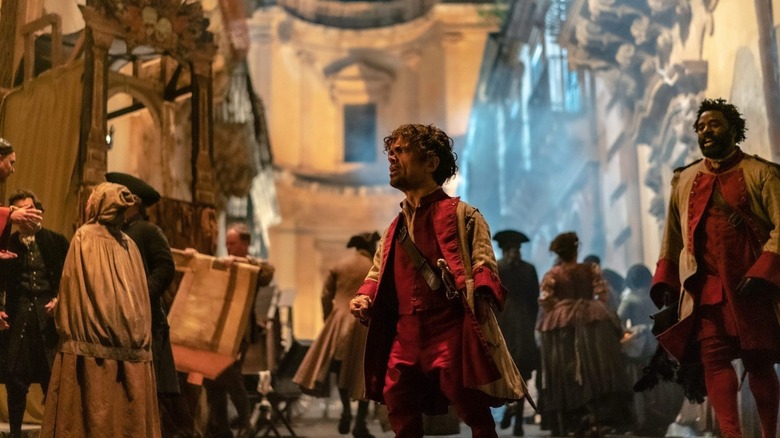Cyrano Review: Peter Dinklage Is A Romantic Revelation In Joe Wright's Handsome Musical Adaptation
One of the great underappreciated assets of a romance film is the male lead's face. Not the level of his beauty or the uniqueness of his features, but his ability to express a quivering, unadulterated yearning. It's The Face, so to speak — the tender look that a male lead gives to the woman of his dreams, as if he's truly seeing her and is awed by her. It's as essential to the romance film as a likable heroine, a palpable chemistry, a heart-fluttering courtship. Sometimes, even when a movie is lacking in any of those things, The Face will make up for it. And oh, does Peter Dinklage have The Face.
Dinklage is incredible as the title character of "Cyrano," Joe Wright's handsomely directed musical adaptation of Edmond Rostand's 1897 play "Cyrano de Bergerac." Contemporary remakes of "Cyrano de Bergerac" have seen a surprising resurgence in recent years, but it's rare to see an adaptation that so directly pays homage to the play's original verse structure (albeit, sparingly) and rarer still to see the titular "ugly" duelist be depicted as so swooningly, unapologetically romantic. It's a testament to Wright's visually resplendent direction, which feels like a throwback to maximalist Hollywood musical productions of old, and of course, the benefit of the casting of Dinklage, one of our most expressive actors working today.
Dinklage's casting works two-fold: no longer is Cyrano the large-nosed poet (a physical feature that in many adaptations is played for laughs more often than not), but a little person. It adds a new layer of depth to the time-worn tale while allowing our leading man to be expressive and romantic without being distracted by a faux facial feature. And by allowing Dinklage to gaze and yearn and be in love — sometimes letting him run the whole gamut of emotions in one single shot, until his crestfallen face absolutely shatters your heart — "Cyrano" finally makes him the romantic leading man that "Game of Thrones" hinted he could be, and that he was always destined to be.
Poetic cinema
Like Rostand's classic play, "Cyrano" takes place in 17th century France and follows the tribulations of the prideful cadet Cyrano de Bergerac, a talented poet and duelist who nurses an unrequited love for the beautiful but vain Roxanne (a breathy Haley Bennett). But Roxanne is currently being pursued by Count De Guiche (Ben Mendelsohn, never sleazier) and has herself fallen in love with the handsome but dim-witted Christian de Neuvillette (Kelvin Harrison Jr., putting a smoother spin on the good-hearted himbo). Yet Cyrano can never deny Roxanne anything, and when she asks him to take Christian under his wing and ensure that Christian writes letters to her, he reluctantly agrees. Thus begins the classic tale: Christian and Roxanne quickly fall in love with each other through Cyrano's dazzling words and rapier wit. But despite what numerous comedic remakes would have you believe, this is a tragedy, and Wright's sumptuous direction treats it as such.
Wright has always had a keen cinematic eye and it felt like it was only a matter of time before he directed a musical — just look at his spectacular 2012 feature adaptation of "Anna Karenina," which was on the cusp of being a stage production — and he pulls it off with "Cyrano." The entire film looks and feels as swooningly romantic as its lead, replete in bold colors, soaring cameras, and surprisingly sensual letter-writing scenes. Wright treats the material with the kind of earnestness that only musicals can convey, though there is a stiffness that he can't overcome which comes with being new to the musical language. While professionally trained dancers pirouette and sashay around the leads, Dinklage, Harrison Jr., and Bennett awkwardly try to match step — and often fall short. Elaborate dance sequences can often feel a little stodgy because Wright prioritizes visual splendor over dynamism. But still, at least Wright has some handle on the fact that musicals have their own visual language (unlike a certain few directors), and while he might get a little lost in translation, he manages to nail the tone.
Similarly, Erica Schmidt's script strikes that same awkward balance — poetic in some parts and jarringly modern in others. Cyrano will spar both metaphorically and literally with another duelist, rattling off clever turns of phrase and rhymes as he casually dodges a sword, but a few scenes later, Christian will blurt some anachronistic phrase that temporarily takes you out of the movie. I don't envy Schmidt's task of adapting a 17th-century play for a modern audience — not to mention one that revolves so heavily around "love at first sight," a concept that a lot of today's moviegoers will have difficulty accepting — but she does an admirable job of doing so while paying homage to the original verse play. And there's a certain charm to this historically-murky approach, lending "Cyrano" a fairy-tale timelessness.
An uneven musical
But the one element that doesn't come together, and which unfortunately takes the movie down a peg, is the music. Written by members of The National, the songs of "Cyrano" reflect the somber balladry of the rock band and are often at odds with the vibrant visuals that Wright prefers. The songs aren't bad, per se, they just don't seem musical-ready, and often feel like they're better suited to being sung morosely by wounded soldiers in an Irish pub than in a swooning romance with elaborately choreographed dance numbers.
And in contrast to the more poetic flairs of Schmidt's script, the lyrics often fall on the simpler side. The one benefit of having a musical's songs written by The National, however, is that they perfectly suit Dinklage's untrained lower register, allowing the star to whisper-growl the melodies in a way that is borderline seductive.
While "Cyrano" is a largely uneven movie musical, it's a visually pleasing romance that has its heart in the right place. And thanks to a revelatory performance by Dinklage (so dashing, so charismatic, so beautiful), "Cyrano" can be forgiven for some of its awkward stumbles. It finally gave us Dinklage as a romantic lead, after all.
/Film Rating: 7.5 out of 10


